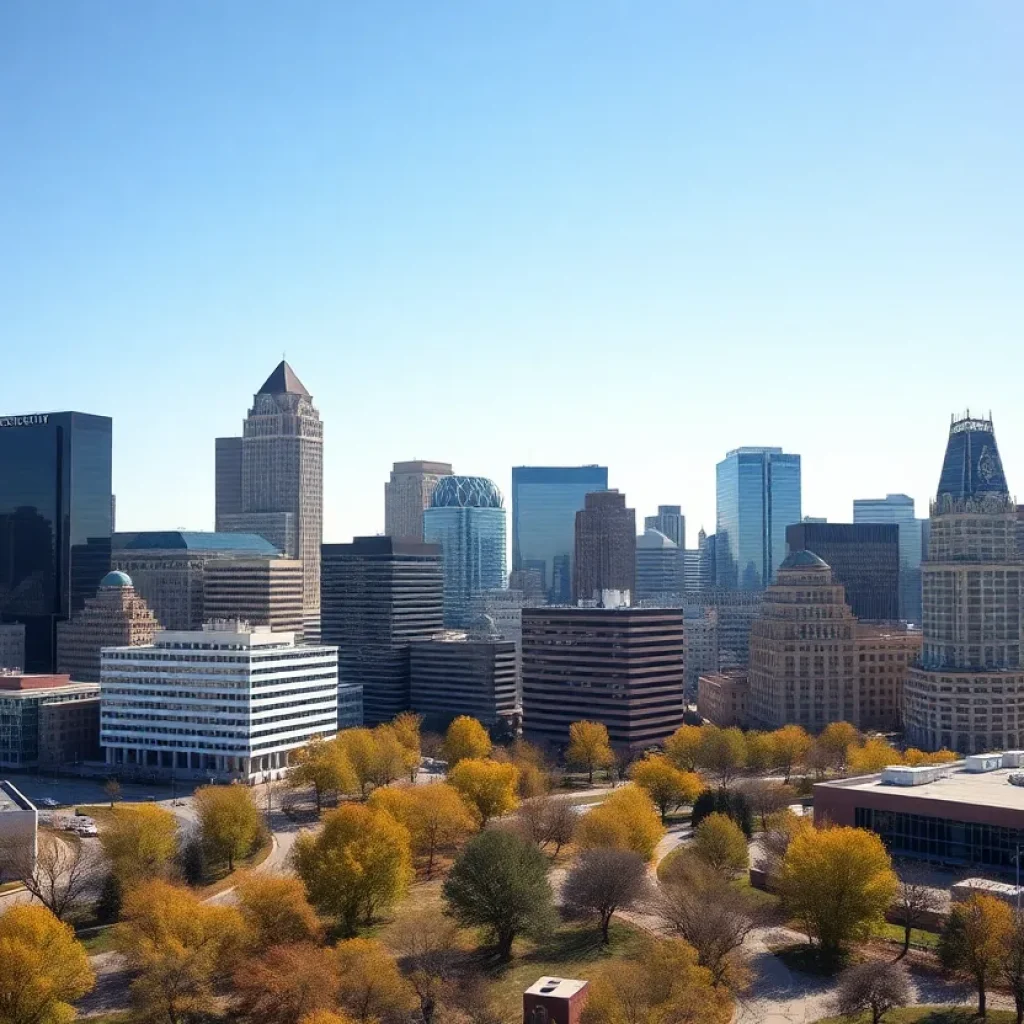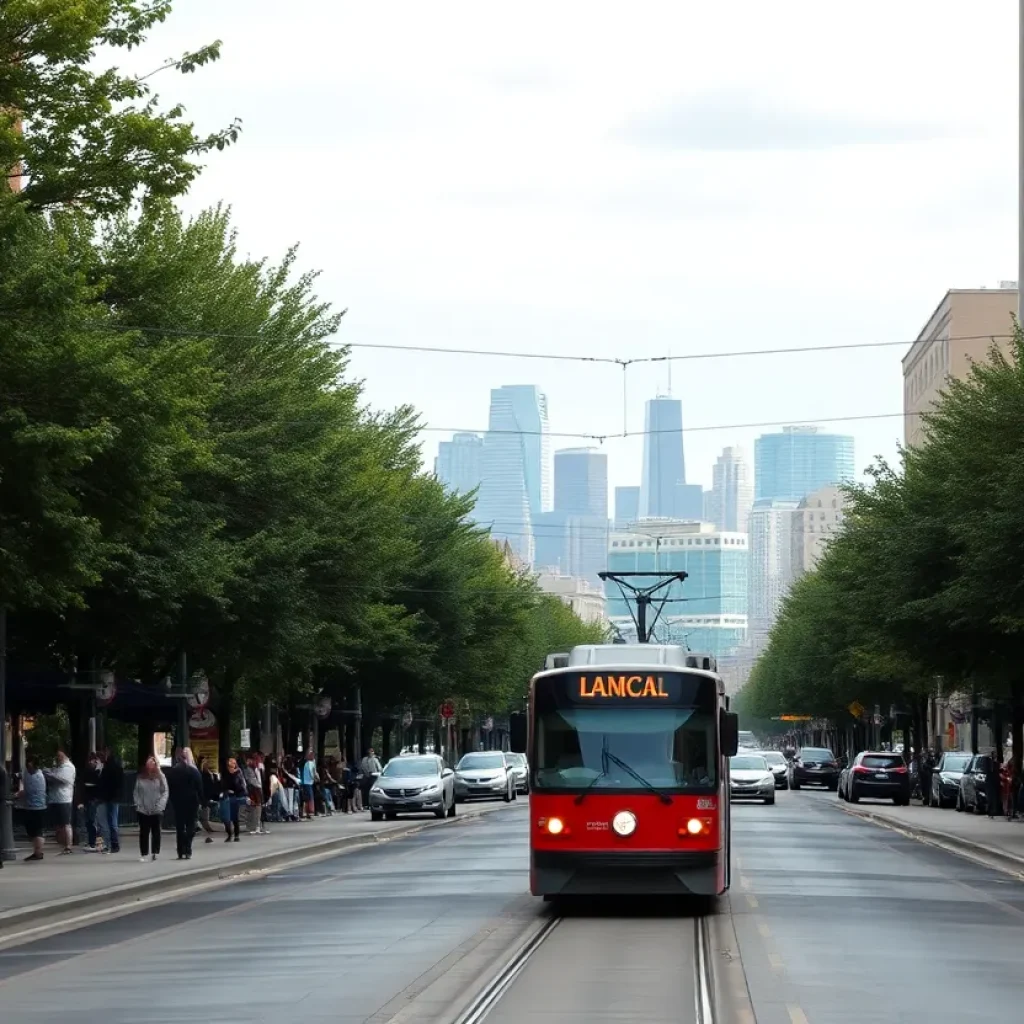Kansas City News
TOP kansas city STORIES
BREAKING NEWS
Kansas City Public Schools Face Crucial Elections and Bond Vote
News Summary On April 8, voters in Kansas City Public Schools (KCPS) will choose new board directors while deciding on a significant $474 million bond for facility improvements. Candidates are...
Conflict of Interest Concerns Surround Judge in Major Lawsuit
News Summary In Kansas City, concerns arise over U.S. District Judge Stephen R. Bough’s impartiality in a pivotal lawsuit involving big names in petrochemicals. The case brought forward by Ford...
Kansas City Man Charged with Business Burglary
News Summary A Kansas City man, Evan Werts, faces serious charges after a late-night burglary where he stole alcohol and cash from a business. The incident raised concerns about community...
Kansas City Faces Critical Vote on Public Safety Tax Renewal
News Summary Kansas City residents will vote on April 8 to renew a quarter-cent public safety sales tax essential for community safety since 2002. The tax generates approximately $24 million...
36-Year-Old Woman Arrested Following High-Speed Chase in Independence
News Summary A woman from Kansas City led police on a dangerous high-speed chase with three children in her vehicle early Saturday morning. The incident started with a disturbance call...
Kansas City Family Takes Legal Stand Following Daughter’s Tragic Death
News Summary In a deeply moving case, the Ortiz family from Kansas City is suing FedEx and Securitas after the tragic loss of their daughter, Reyna Ortiz, who died by...
BUSINESS
New Westlake Ace Hardware Locations Coming to Grain Valley and Shawnee
News Summary Grain Valley and Shawnee residents can look forward to new Westlake Ace Hardware locations. The Grain Valley store plans to open in early 2026, while the Shawnee store...
Cosmo Burger to Open New Location in Kansas City
News Summary Kansas City’s beloved burger joint, Cosmo Burger, is moving to a new standalone location in the Crossroads district. The Lenexa Public Market spot will close on April 19,...
Rhonda Jolyean Hale Drives Kansas City LEGO Project for Kids
News Summary Rhonda Jolyean Hale is leading the ‘Pass the Bricks’ initiative in Kansas City, ensuring children in need have access to LEGO sets. By repurposing gently used bricks, the...
Hallmark Introduces Gift Card Greetings in Kansas City
News Summary Kansas City’s own Hallmark Cards, Inc. has launched an innovative new product, Gift Card Greetings. This unique offering combines traditional greeting cards with digital gift cards. Now gift-givers...
Discover Missouri’s Most Expensive ZIP Codes: A Glimpse Into the Luxe Life
News Summary Explore Missouri’s luxurious neighborhoods as we reveal the most expensive ZIP codes in the state. An analysis of housing data shows Ladue tops the list with median home...
Ollie’s Bargain Outlet Opens New Location in Independence
News Summary Ollie’s Bargain Outlet is set to open its third Kansas City metro location in Independence on April 9, 2023. Located at 4201 S. Noland Road, shoppers can expect...
Kansas City Welcomes The Yard Milkshake Bar
News Summary The Yard Milkshake Bar has opened its first location in Kansas City’s Power & Light District, bringing extravagant milkshakes and desserts from Alabama. This franchise, known for its...
Associated Banc-Corp Expands Commercial Banking Team
News Summary Associated Banc-Corp has announced the hiring of three experienced bankers in Kansas City, aiming to strengthen its presence in the market. Matt Flynn, Alexander Burke, and Mitchell Hind...
BarGlance Introduces AI Features to Enhance Nightlife
News Summary BarGlance is set to revolutionize nightlife in major cities like Dallas, Las Vegas, Miami, and Kansas City with its new AI technology. The company, which has recently acquired...
Events/What's Happening
Carousel Musical to Debut in Kansas City 2025
News Summary Kansas City is gearing up for a magical experience as Music Theater Heritage announces the production of the classic musical Carousel from April 3 to April 27, 2025....
Kansas City to Vote on $474 Million School Bond
News Summary On April 8, Kansas City voters will decide on a $474 million bond proposal to improve public schools, marking the first such initiative since 1967. If passed, this...
Kansas City Food Scene Expands with New Openings and Events
News Summary Kansas City’s vibrant food scene is flourishing with new restaurants and exciting community events. Highlights include unique brunch offers, local art collaborations, and initiatives to support community needs....
Kansas City Royals Gear Up for Opening Day Promotions
News Summary The Kansas City Royals are set to launch their exciting 2025 season with a special promotion at Kauffman Stadium on April 5, 2025. The first 10,000 attendees will...
Fun-Filled Weekend Events in Kansas City: April 4-6, 2025
News Summary Kansas City is gearing up for an exciting weekend from April 4 to 6, 2025, featuring a variety of activities suitable for all interests. Highlights include the return...
Casting Calls Abound in Kansas City
News Summary Aspiring actors in Kansas City have exciting opportunities to step into the spotlight with multiple casting calls currently available. Whether you’re a seasoned performer or a newcomer, there...
Weekend Events in Kansas City: April 3–6
News Summary Kansas City has a vibrant lineup of events this weekend, from theater performances like ‘Back to the Future: The Musical’ to jazz concerts and cultural festivals. With family-friendly...
Kansas City Misses Out on James Beard Award Nominations
News Summary Despite having hopes for a strong showing at this year’s James Beard Awards, Kansas City chefs were left without any nominations. While local restaurants had eight semifinalists in...
Gretchen Rubin Returns to Kansas City with New Book
News Summary Gretchen Rubin, best-selling author, is set to return to Kansas City on April 3, 2024, to promote her new book ‘Secrets of Adulthood.’ The event will be held...
CRIME
Kansas City Man Charged with Business Burglary
News Summary A Kansas City man, Evan Werts, faces serious charges after a late-night burglary where he stole alcohol and cash from a business. The incident raised concerns about community...
36-Year-Old Woman Arrested Following High-Speed Chase in Independence
News Summary A woman from Kansas City led police on a dangerous high-speed chase with three children in her vehicle early Saturday morning. The incident started with a disturbance call...
Kansas City Police Launch Search for Missing Man Brandon Anfinson
News Summary Kansas City police are seeking help in locating Brandon Anfinson, a 39-year-old man who has been missing since March 21. Despite investigations revealing no substantial leads, authorities remain...
Kansas City Homeowner Charged for Firing Gun at Teens
News Summary A Kansas City homeowner, 66-year-old Theresa L. Viscardis, faces charges after allegedly firing a gun at three teenagers near Ward Parkway Center. On March 28, 2025, the incident...
Kansas City Man Faces Charges After Bar Fight Injury
News Summary A Kansas City man, Teron D. Spagner, faces serious charges after a bar fight resulted in a victim suffering a traumatic brain injury. The incident escalated when Spagner...
Alcides Roman Sentenced for Nationwide Ponzi Scheme
News Summary Alcides Roman, a 66-year-old from Lebanon, Tennessee, has been convicted for running a Ponzi scheme that defrauded victims of nearly $1.9 million. Operating under the name Remain in...
POLITICS
Kansas City Public Schools Face Crucial Elections and Bond Vote
News Summary On April 8, voters in Kansas City Public Schools (KCPS) will choose new board directors while deciding on a significant $474 million bond for facility improvements. Candidates are...
Conflict of Interest Concerns Surround Judge in Major Lawsuit
News Summary In Kansas City, concerns arise over U.S. District Judge Stephen R. Bough’s impartiality in a pivotal lawsuit involving big names in petrochemicals. The case brought forward by Ford...
Kansas City Faces Critical Vote on Public Safety Tax Renewal
News Summary Kansas City residents will vote on April 8 to renew a quarter-cent public safety sales tax essential for community safety since 2002. The tax generates approximately $24 million...
Kansas City Family Takes Legal Stand Following Daughter’s Tragic Death
News Summary In a deeply moving case, the Ortiz family from Kansas City is suing FedEx and Securitas after the tragic loss of their daughter, Reyna Ortiz, who died by...
Kansas City Voters Confront Tax Renewal for Jail Construction
News Summary Kansas City residents are gearing up to vote on a crucial quarter-cent sales tax renewal, aimed at funding public safety and a controversial new jail project. With community...
Kansas City Faces Crucial Vote on Public Safety Proposal
News Summary Kansas City voters are set to decide on extending a public safety sales tax for 20 years, referred to as the ‘jail vote.’ The proposal aims to raise...
Kansas City Faces Crucial Vote on Public Safety Sales Tax Renewal
News Summary Kansas City is preparing for an important vote on April 8 regarding a quarter-cent public safety sales tax, which has provided approximately $24 million annually for 23 years....
Kansas City Homeowner Charged for Firing Gun at Teens
News Summary A Kansas City homeowner, 66-year-old Theresa L. Viscardis, faces charges after allegedly firing a gun at three teenagers near Ward Parkway Center. On March 28, 2025, the incident...
Concerns Rise in Missouri Over New Second Amendment Preservation Act
News Summary Missouri law enforcement leaders are raising concerns over the reintroduced Second Amendment Preservation Act (SAPA), which could prevent them from enforcing federal gun laws. The new House Bill...
SPORTS
Kansas City Royals Gear Up for Opening Day Promotions
News Summary The Kansas City Royals are set to launch their exciting 2025 season with a special promotion at Kauffman Stadium on April 5, 2025. The first 10,000 attendees will...
Fun-Filled Weekend Events in Kansas City: April 4-6, 2025
News Summary Kansas City is gearing up for an exciting weekend from April 4 to 6, 2025, featuring a variety of activities suitable for all interests. Highlights include the return...
Weekend Events in Kansas City: April 3–6
News Summary Kansas City has a vibrant lineup of events this weekend, from theater performances like ‘Back to the Future: The Musical’ to jazz concerts and cultural festivals. With family-friendly...
Events Happening in Kansas City This Weekend: March 28-30, 2025
News Summary From art exhibits to thrilling sports events, Kansas City offers an exciting weekend from March 28-30, 2025. Highlights include the Orchid Delirium exhibit, Kansas City FilmFest, Royals baseball...
Kansas City Royals Fine-Tune Roster Ahead of Season
News Summary As Opening Day approaches, the Kansas City Royals are making strategic roster adjustments. They have sent Nick Pratto and Nelson Velázquez to Triple-A Omaha while adding veteran Mark...
Weekend Events in Kansas City from March 20-23
News Summary This weekend in Kansas City offers a variety of events for art lovers, sports enthusiasts, and family fun. Enjoy an art workshop, a comedy book signing, an exciting...
Transformative Weekend Ahead in Kansas City
News Summary This weekend, Kansas City will be alive with vibrant celebrations and new dining experiences in celebration of St. Patrick’s Day and the Big 12 basketball tournament. Events include...
Kansas City Prepares for Streetcar Expansion
News Summary Kansas City is gearing up for an expansion of its streetcar service by March 8, 2025, enhancing public transportation just in time for major sports events. With four...
Missouri Celebrates Team Spirit Ahead of Super Bowl LIX
News Summary The state of Missouri is bursting with pride as the Kansas City Chiefs prepare for their third consecutive Super Bowl appearance against the Philadelphia Eagles. The iconic Missouri...










































